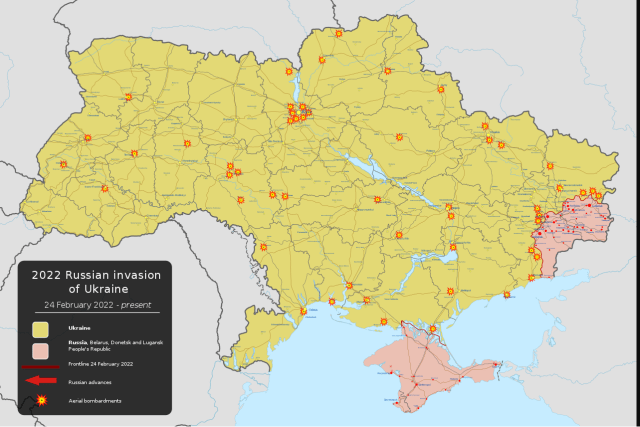Russia starts military operations in Ukraine

The Russian Federation launched a military operation in Ukraine, threatening consequences for those who interfered in the conflict supporting Kyiv.
At almost 6 am in Moscow, Putin announced the Russian attack on Ukraine on TV. Strong explosions were immediately felt in Ukrainian cities in Odesa, Kharvik, Mariupol, Lviv and in the capital Kyiv, where the Russians allegedly attempted to take control of the airport. According to the Ukrainian Interior Ministry, Russian troops have landed in Odesa while others are crossing the border towards Kharkiv.[1]
The Russian defence ministry announced that they ‘destroyed the Ukrainian air defences’ while the Ukrainian authorities reported their artillery shooting five Russian planes and a helicopter. Russian forces would also enter Ukraine from Belarus and Crimea. Belarusian President Lukashenko summoned the heads of the armed forces.
Russian President Vladimir Putin urged that Kyiv’s forces hand over their weapons and “go home”, assuring that Moscow’s plans do not include the occupation of Ukraine but demilitarising the country with a particular operation.
The NATO Secretary-General Jens Stoltenberg read a statement released by the Alliance which “strongly condemns” Russia’s unjustified attack on Ukraine and asked Moscow “to stop its military action immediately”. Furthermore, he reiterated his support for the Ukrainian people and reaffirmed that he would do “whatever is necessary to protect and defend his allies”. Biden said that the Russian president had chosen a premeditated war to lead to a catastrophic loss of life and suffering. The United States and its allies “will impose tough sanctions on Russia”, and they will continue “to provide support and assistance to Ukraine and its people”.[2]
Why does it matter?
The Russian president Vladimir Putin is testing the West, especially the United States, to see if there will be a military reaction or, as happened in 2008 in the case of Georgia, Washington and Brussels will only economically target the Russian Federation with sanctions.
The Russian invasion in Ukraine demonstrated the Russian strategy to regain control of what Moscow considers its blizhnee zarubezhe (near abroad) and lebensraum (vital space), creating a buffer zone in Central and Eastern Europe and restoring a sort of Soviet Union.
The conflict will cause a vast humanitarian crisis that will affect Europe. In addition, the Russian invasion will severely hit both the European and Russian economies, as the market has shown since this morning.
Sources
[1] BBC (2022) Россия начала “военную операцию” на Украине. Link: https://www.bbc.com/russian/news-60503311
[2] NATO (2022) NATO Allies condemn Russia’s invasion of Ukraine in the strongest possible terms. Link: https://www.nato.int/cps/en/natohq/news_192406.htm
Update: February 24th, 2022 – Time: 9.30 am CET. Our team constantly monitors the events in Ukraine. For further information, please get in touch with us at this LINK.
